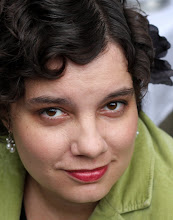Capitalizing on today's response to the parenting column, I am now hoping to get people's responses to this article, Truly, Madly, Guiltily, from the New York Times in 2005. The article was part of the Time's Modern Love column. The first time I read the article I actually gasped out loud. I could not believe what the woman wrote. And then I kept thinking about her kids reading the article when they were big enough to do so. I don't want to give it away, but I can't wait to see what everyone thinks!
This article has come up a few times in my writing classes and even in some other conversations. The author, Ayelet Waldman, is married to one of my favorite authors, Michael Chabon. (Who incidentally dated one of my former work colleagues when they were getting their MFA's together!)
Click this sentence to go to the article. Let me know what you think!
9.23.2009
Subscribe to:
Post Comments (Atom)


3 comments:
This sounds like a happy and healthy marriage, which can only benefit the children. JPG
I read this article when it first came out, and to a certain extent, I actually kind of agree with her, but she is going for a bit of shock value. I guess it goes along with the balance sought in the comments regarding parenting. Of course we love our kids desperately. However, children cannot and should not replace the relationship you have with your spouse. You and your spouse are the core relationship in family, and without that relationship, the family dissolves. I think solely focusing on nurturing your children and taking the nuturing focus off of the relationship with your spouse is the cause of more harm to your child than anyone realizes.
Also, her husband sounds really great - he really does his share of the household duties, etc. but he still actually engages in conversation about their life together, her body, their shared passions. I think that it's not just women whose focus goes away from the core spouse relationship when the kids come. I can't remember the last time my husband and I had a conversation that wasn't about getting stuff done - for kids, house, finances. Her relationship seems like it's still like our relationship was in the beginning - stimulating.
But seriously, "No Joy" in her life without her husband? I don't think any modern woman should ever be so dependent on a single person (whether spouse or kids) to expect never a moment of joy without them. Ridiculous. Codependent.
I took an instant shock reading this. Not because she loves her husband more than her children, she could love her chiwawa more than her children and I wouldn't bat an eyelid. There are, after all, many people who claim they live for their children and in reality they live for their car, their social life, appearances or whatever.
What strikes me as disturbing is this: where on earth does she come from comparing her love for her husband to her love for her children? It's a different relationship. Entirely different. A different kind of love. Not comparable. Not mutually exclusive. Not more or less, not either or. You love your children, period. And you love your husband, end of story.
Genuine love can not be put in a measuring cup. Nor is it finite, as in 'I've got 500 cl of love, 200cl is for my children, and 300cl for my husband'. The love for one's children is a kind of unconditional not-expecting-anything-in-return kind of love that nature grants only in the relationship between parent and child. If your parents love you, life has given you a precious gift. If your parents don't love you, this is a wound that the love of a partner can comfort but can never replace.
Because the love for your partner, as important and as precious as it is, is never unconditional. You always expect something in return: Partnership. And that's how it should be. This doesn't mean that one kind of love is inferior to the other. They're just different.
So saying that she loves her husband more than she could ever love her children points to the really screwed up issue here: The love she is referring to seems to be completely selfish. She measures her love for her family based on how inconvenienced HER life would be if they die. If her children die, SHE'll be more or less fine. But if her husband dies, life is over for HER. How about feeling sad over the unlived life of a dead child, or husband? How about the tormenting doubt of whether they managed to find fulfillment and happiness in their lives? And if you can't even imagine that life is worth living without your husband (when you can easily imagine it without your children), is this really love, or is this a drug you're on?
The whole article feels like a dim rationalization, a pseudo-intellectual attempt to pass on as valid or forward-thinking the sad fact that she doesn't know what love is.
And, by the way, she seems to think she's the only married person with children left in the world having sex. Well actually...
Post a Comment